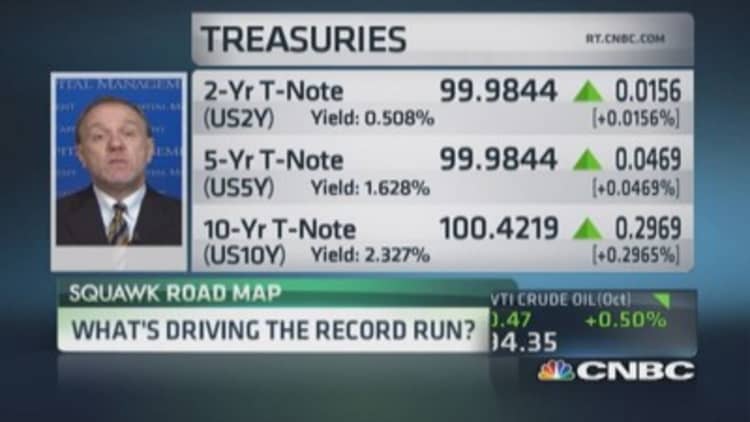All those headlines about new stock market highs may look sexy, but life for active managers hasn't been quite so much fun.
In fact, running large-cap mutual funds has been a rough business, with about 80 percent underperforming the in 2014, according to S&P Capital IQ Fund Research. That's four out of five managers who've failed to match a simple stock market index fund that usually has lower fees and other advantages.
There are a handful of explanations for why performance has been so weak this year, but at the core seems to be the general and stunningly persistent belief that the market remains ahead of itself, with danger always right around the corner. Fear of a looming correction has kept many investors playing defense.
"We've gone 35 months without a decline of 10 percent or more, and the median since World War II is 12 months," said Sam Stovall, S&P's chief equity strategist. "Everybody seems to be waiting for that all-elusive correction, when everyone will pile in. But if everybody's waiting for it, it won't happen."

Read MoreTwo experts warn correction could total 60%
Stovall believes the trouble active managers have had actually could feed into the market rally. As the year winds down, managers may begin to chase performance, taking on more risk or actively seeking out poorly performing sectors such as small-cap stocks.
"If they underperform by too much, they don't get their bonus," he said. "With 80 percent underperforming vs. the more normal 73 percent, you have a greater number of fund managers who are going to feel like they've got to really turn in the afterburners to hopefully outpace the market by the end of the year."
There is, however, a bit of a silver lining in the troubles for active managers.
Todd Schoenberger, president of J. Streicher Asset Management, said the underperformance actually is indicative that managers are prudently reducing risk during an aging market rally.
"If you have a portfolio manager who's knocking the ball out of the park and hitting grand slams, doing amazing performance, the investor should always ask what is the amount of risk being taken to achieve that number," he said. "If you have a portfolio manager making 30 percent, there's a solid chance they can lose 30 percent. The portfolio managers, even though they're lagging the averages, they're probably doing the prudent thing in managing risk."
Read MoreWhy you should avoid the hottest hedge fund hands
Active management has lagged in the years since the financial crisis—ever since the Federal Reserve employed a historically strong intervention into financial markets and stocks have operated on a risk-on risk-off mode, with correlations high and little place else to go for return but equities.
Investors have flocked from mutual funds since the crisis, though at least in terms of money flows 2013 and 2014 have been better years.
The exchange-traded fund industry, which uses passively managed low-cost index funds, has exploded to $1.81 trillion under management, a 20 percent gain over just the past 12 months, according to the Investment Company Institute. The $15.7 trillion industry has grown 14.8 percent in the 12-month period—respectable, for sure, but behind ETFs.
Read MoreAre you rich enough to be a hedge fund investor?
Doug Roberts at Channel Capital Research believes extreme central bank easing has made it tougher on active managers.
"Once you have everything going up, it's really difficult for an active manager to outperform," he said. "He has to be right on the mark. He has to get into something that not only has good long-term fundamentals but also is at an inflection point. That's no small task."
—By CNBC's Jeff Cox






